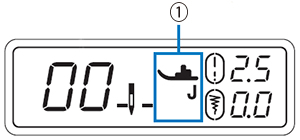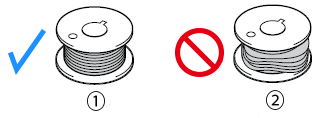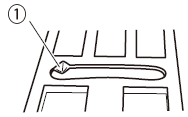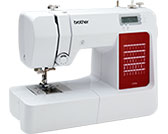CS10s
FAQs & Troubleshooting |
Needle breaks.
When the needle breaks, replace it with a new one.
For details on replacing the needle, refer to "How do I change the needle ?".
Also, check the following possible causes and solutions.
-
Needle is installed incorrectly.
Reinstall the needle correctly.
Refer to "How do I change the needle ?".
-
Needle clamp screw is not tightened.
Tighten the needle clamp screw.
Refer to "How do I change the needle ?".Be sure to insert the needle until it touches the needle stopper and securely tighten the needle clamp screw with the screwdriver, otherwise the needle may break or damage may result.
-
Needle is turned or bent.
Replace the needle.
For details on checking and replacing the needle, refer to "How do I change the needle ?".Never sew with a bent needle. A bent needle will easily break and may cause injury.
-
Using improper needle or thread for the selected fabric.
Check the Fabric/Thread/Needle Combinations chart.
For more information on the proper needle or thread for the selected fabric, refer to "Combination of fabric, thread and needle".If the combination of the fabric, thread and needle is not correct, particularly when sewing heavy fabrics (such as denim) with thin needles (such as 65/9 to 75/11), the needle may bend or break.
-
Wrong presser foot was used.
Use the recommended presser foot.When a stitch is selected, the symbol for the presser foot that should be used is shown in the LCD. Check that the appropriate presser foot is attached before starting to sew. If the wrong presser foot is attached, attach the appropriate presser foot.

(1) The presser foot to be used with the selected stitch appears. For details on the LCD screen, refer to "Outline of viewing the LCD Screen".
Use the appropriate presser foot for the type of stitch that you wish to sew, otherwise the needle may hit the presser foot, causing the needle to bend or break.
For details on the presser foot that should be used with the selected stitch, refer to Stitch Chart.
-
Upper threading is incorrect.
Check the steps for threading the machine and rethread the machine.
For details on threading the machine, refer to "How do I thread my machine?".If the upper threading is not correct, the thread may become tangled or the needle may bend or break.
-
Bobbin is installed incorrectly.
Check the steps for installing the bobbin into the machine and reinstall the bobbin thread.
For details on installing the bobbin, refer to "How do I install the bobbin wound with thread?".
-
Bobbin thread is incorrectly wound.
Use a correctly wound bobbin.
Check the steps for winding the bobbin and rewind the bobbin thread.
For details on winding the bobbin, refer to "How do I wind the bobbin?".Use a bobbin that has been correctly wound with thread, otherwise the needle may break or the thread tension will be incorrect.

(1) Wound evenly
(2) Wound poorly
-
Upper thread tension is too tight.
Loosen the upper thread tension so that it is appropriate.
For details on adjusting the thread tension, refer to "How to adjust the thread tension".
-
Fabric is pulled during sewing.
Do not pull the fabric during sewing.
-
A bobbin designed specifically for this machine is not used.
Incorrect bobbins will not work properly.
Be sure to use the included bobbins (part code: SA156, SFB: XA5539-151) or the same type.
SA156 is Class 15 type bobbin.
The bobbin's height is 11.5 mm (approx. 7/16 inch).
(1) 11.5 mm (7/16 inch)
-
Presser foot is attached incorrectly.
Attach the presser foot correctly.
For details on attaching the presser foot, refer to "How do I remove or attach the presser foot ?".
-
Screw of the presser foot holder is loose.
Securely tighten the screw of the presser foot holder.
For details on attaching the presser foot holder, refer to "How do I remove or attach the presser foot holder?".
-
Fabric is too thick.
Use fabric that the needle can pierce when the handwheel is turned.
Refer to "Tips for sewing thick fabrics".
-
Fabric is fed forcefully when sewing thick fabric or thick seams.
Allow the fabric to be fed without being forcefully pushed.
Refer to "Combination of fabric, thread and needle", "Tips for sewing thick fabrics".
-
Stitch length is too short.
Adjust the stitch length to lengthen.
For details on adjusting a stitch length, refer to "How do I adjust a stitch width or length?".If stitches become bunched, lengthen the stitch length setting before continuing sewing. Otherwise, the needle may break.
-
There are scratches around the opening in the needle plate.
Replace the needle plate. To obtain parts, contact your authorized Brother dealer.
*There is a notch on the left side of the opening in the needle plate. This is not a scratch.
(1) Notch
-
There are scratches around the opening in the presser foot.
Replace the presser foot. To obtain parts, contact your authorized Brother dealer.
-
There are scratches on the bobbin case.
Replace the bobbin case. To obtain parts, contact your authorized Brother dealer.
Related FAQs
- Combination of fabric, thread and needle
- How do I wind the bobbin?
- How do I thread my machine? (For models equipped with the needle threader)
- How do I install the bobbin wound with thread? (For models equipped with a quick-set bobbin)
- How do I remove or attach the presser foot ?
- How do I change the needle ?
- How do I remove or attach the presser foot holder?
- How do I adjust a stitch width or length?
- How to adjust the thread tension
- Tips for sewing thick fabrics
- Outline of viewing the LCD Screen
